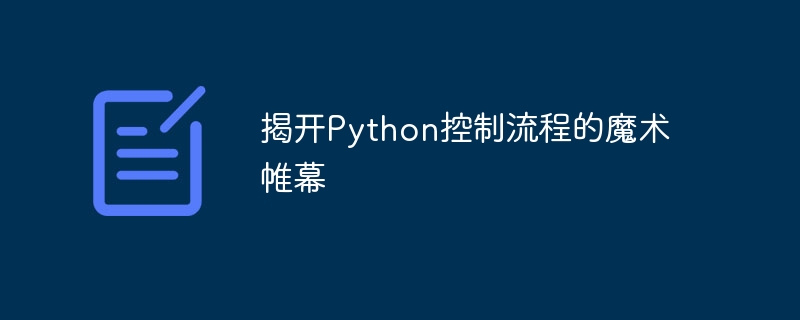Home >Backend Development >Python Tutorial >Uncover the magic curtain of Python control flow
Uncover the magic curtain of Python control flow
- WBOYWBOYWBOYWBOYWBOYWBOYWBOYWBOYWBOYWBOYWBOYWBOYWBforward
- 2024-03-16 16:00:12535browse

Conditional statements:
Conditional statements are used to execute different blocks of code based on specific conditions. The most commonly used conditional statement is the if statement, which checks the value of an expression and executes the following statements if the expression is true. Additionally, there are elif statements that can be used to check for other conditions, and else statements that can be used to execute code if all other conditions are false.
cycle:
Loops can be used to repeatedly execute a block of code a specified number of times or until a specific condition is met. The most common loop is the for loop, which iterates over each element in a sequence (such as a list or tuple) and executes a block of code on each iteration. Additionally, there are while loops that continuously execute a block of code as long as a specific condition is met.
function: Functions are reusable units that encapsulate blocks of code that can be used to perform specific tasks. Functions can receive parameters, execute code within them, and return a result. By organizing code into functions, you can improve the readability and maintainability of your program.
Control flow example:
The following code snippet shows an example of the python control flow concept:
# Conditional statements
if age >= 18:
print("You are an adult.")
elif age >= 13:
print("You are still a teenager.")
else:
print("You are still a child.")
# Loop
for item in items:
print(item)
# function
def calculate_average(nums):
total = sum(nums)
average = total / len(nums)
return average
Advanced control flow:
In addition to basic control flow, Python also provides some advanced functions, such as:
- Generator expressions: Generator expressions are a syntax that simplifies looping and allows the creation of generators in a single line.
- List analysis: List analysis is a concise syntax for generating new lists, iterating and transforming based on existing lists.
- Exception Handling: Exception handling allows programmers to handle errors that occur during code execution and recover in a graceful manner.
in conclusion:
Python's control flow provides powerful mechanisms for controlling the order and conditions of program execution through conditional statements, loops, functions, and other advanced features. By understanding these concepts, programmers can write Python programs that are efficient, readable, and maintainable.
The above is the detailed content of Uncover the magic curtain of Python control flow. For more information, please follow other related articles on the PHP Chinese website!

